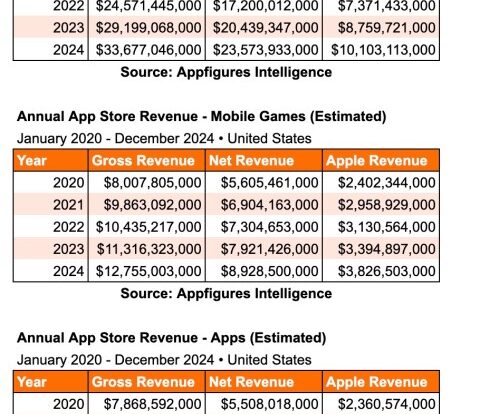
More than $10 billion—that’s the amount of revenue generated by Apple’s U.S. App Store for the previous year, as revealed by an analysis conducted by an application intelligence company.
Appfigures
.
The firm’s estimates indicate that U.S. App Store revenue from commissions more than doubled between 2020 and 2024. In 2020, Apple’s share of App Store commissions was approximately $4.76 billion, growing to over $10.1 billion by 2024.
According to Appfigures’ statistics, U.S.-based developers earned $33.68 billion in total gross revenue through the Apple App Store via Apple’s payment systems in 2024. After deducting Apple’s commission, they retained approximately $23.57 billion.
Although Apple usually does not separate out its App Store revenues when reporting earnings,
It released a report in May 2023.
Where it was stated that the App Store generated an estimated $104 billion in billings for digital products and services worldwide in 2022.
Appfigures’ analysis revealed that the global revenue from the App Store reached $61.5 billion in 2022, increasing to $91.3 billion by 2024. According to their report, Apple earned over $27.39 billion in commission worldwide in the previous year.
This results in a difference between Appfigures’ findings and Apple’s own data.
This can be clarified by an essential disclaimer included in Apple’s report. According to Apple’s chart, their “revenues and sales” numbers are
“not the same as App Store billings.”
That’s important here.
When compiling its report, Apple aimed to highlight the substantial size of the App Store and its crucial role in the broader economy. Therefore, the company combined revenues from within the App Store with those originating externally under the umbrella term “Billings and Sales.”
In the report, Apple calculated the portion of an app’s total revenue that is facilitated by the App Store, even if the purchase was made elsewhere. For instance, if a user buys a subscription to Hulu on the web, but then spends 60% of their time streaming Hulu on Apple devices, Apple credits itself with facilitating 60% of that user’s spend. (To determine usage, the report relied on third-party sources, like market research firms, to estimate how much usage occurred on smartphones versus tablets, desktops, or TVs.)
Apple also allows enterprises to distribute apps with in-app purchases, but these aren’t visible in the App Store.
“Grave Irreparable Harm?”
Examining the numbers around U.S. Apple App Store revenue is more relevant than ever in the wake of the recent court ruling that now prevents Apple from charging a 27% commission on transactions that take place outside the App Store.
Apple initially attempted to comply with the court’s injunction resulting from
its antitrust battle with Fortnite maker Epic Games
by making changes that wouldn’t harm App Store profits.
To do so,
Last year, Apple provided developers with
A method was devised to seek an exemption from the App Store guidelines, enabling them to include web links within their applications that would guide users towards external transactions. Nevertheless, Apple maintained a 27% fee on these transactions and specified how the webpage links ought to be displayed. This stipulation also encompassed the requirement for “warning screens” designed to alert buyers about the risks associated with purchasing outside the confines of the App Store.
Last week, a judge
ruled that Apple
operated in “deliberate defiance” of the 2021 injunction by persisting to charge fees for transactions occurring outside the applications and by establishing additional anti-competitive obstacles.
This choice compelled Apple to
revise its guidelines for the U.S. App Store
, which now enables developers to connect external options for customers to complete their purchases, free from barriers and fees. Following this update, various applications have utilized the capability to incorporate web-based payment methods, among them:
Spotify
,
Amazon Kindle
, and
Patreon
. A tiny video game emulator known asصند
Delta is now supporting itself via Patreon
memberships, too.
Apple is appealing the decision,
arguing in its most recent filing
that the ruling causes Apple “grave irreparable harm.”
“These constraints, costing Apple significant amounts each year, are founded on behavior that has never been judged as (nor actually is) illegal,” according to Apple.
filing stated
Instead, these penalties were enforced to discipline Apple for alleged failure to comply with a previous state law injunction which is also deemed invalid.
This point may not be popular among developers since numerous people think Apple should have reduced commission rates for all parties involved instead of just for some.
small business developers
.
AppFigures’ analysis similarly dissected U.S. App Store revenues from apps and games, contributing roughly $6.28 billion and $3.83 billion, respectively, to Apple’s earnings in 2024.
These numbers collectively underscore the importance of App Store revenue to Apple’s financial health, explaining why they are strongly resisting losing control over it.






